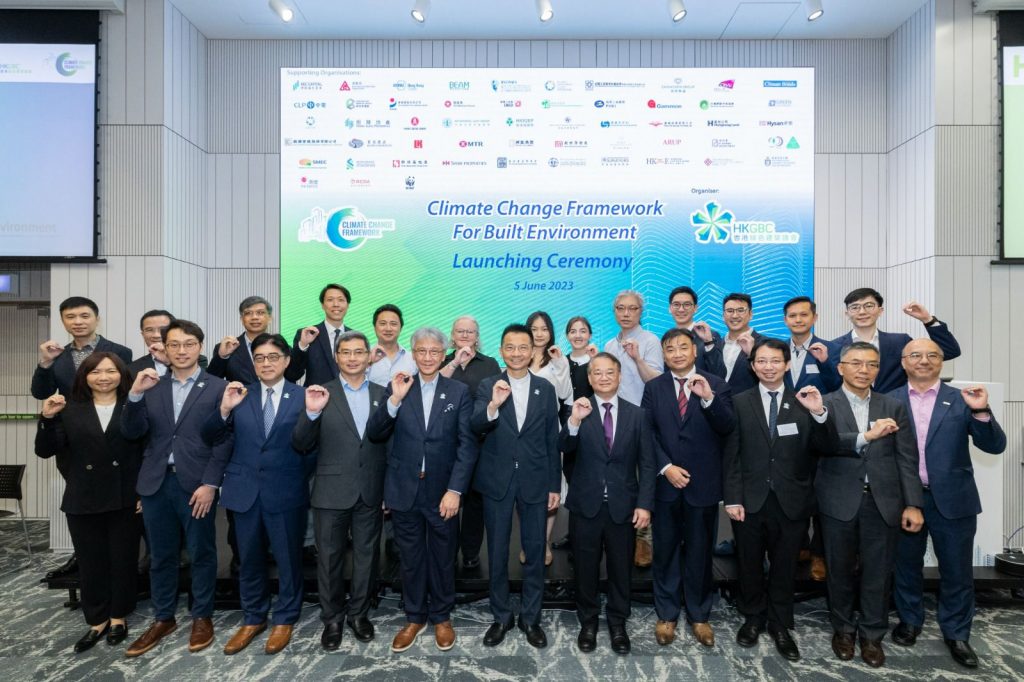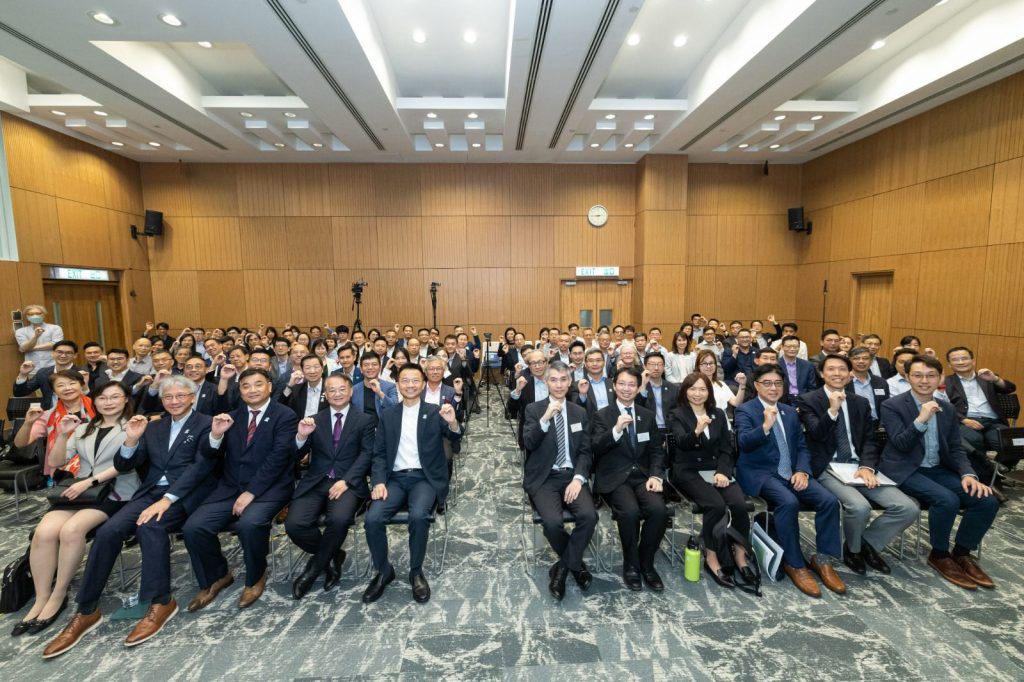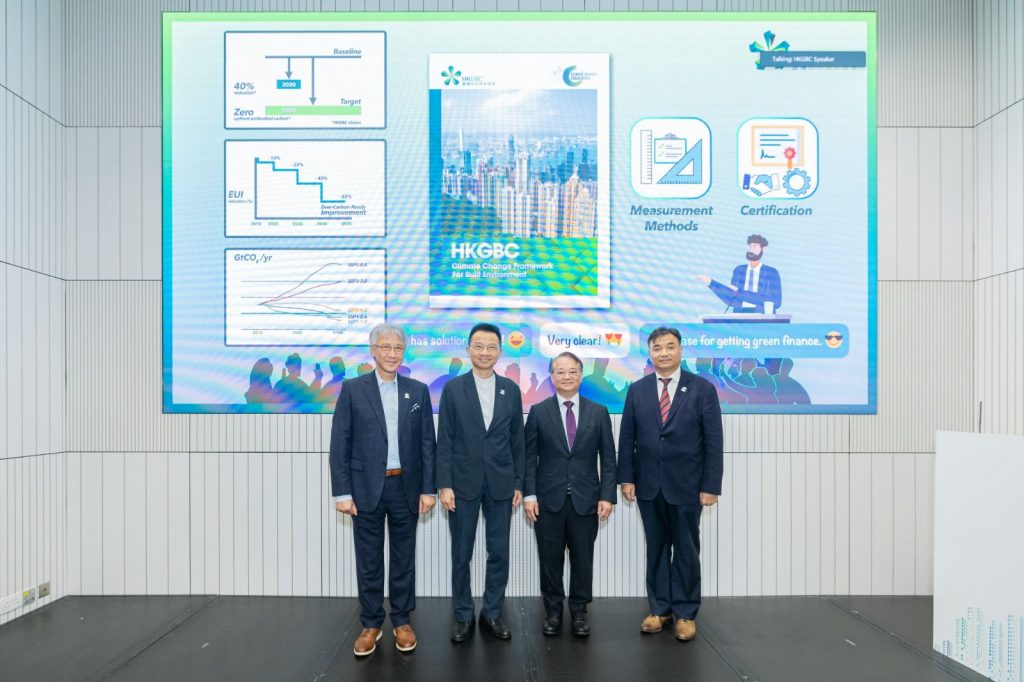(6 June 2023, Hong Kong) The Hong Kong Green Building Council (HKGBC) launched Hong Kong’s first “Climate Change Framework for Built Environment” at a ceremony yesterday that brought together industry leaders and experts to chart a path towards decarbonisation. Dr Samuel CHUI, JP, Director of Environmental Protection, the Government of the HKSAR served as the Guest of Honour and underscored the importance of the framework in facilitating the Hong Kong building sector’s transition to carbon neutrality. Representatives from the government and various sectors also shared their ongoing efforts to adapt to climate change and reduce carbon emissions. The launch of the Framework was fully supported by over 50 supporting organisations.
(按此瀏覽中文版)
The HKGBC has developed a Climate Change Framework (Framework) to assist the building industry in setting net zero carbon goals, reporting environmental, social and governance achievements, justifying green finance requirements, and disclosing climate risk strategies. As part of the Framework, the HKGBC is launching the “Zero-Carbon-Ready Building Certification Scheme” this July, with participation from more than ten major developers including Chinachem Group, Hang Lung Properties Limited, Henderson Land, Hongkong Land, Hysan Development Company Limited, MTR Corporation, Nan Fung Group, New World Development Company Limited, Nina Hospitality Company Limited, Sino Group, Sun Hung Kai Properties Limited, Swire Properties Limited, and as well as other key industry players.

Focusing on consistency as a living document and continually refined by the HKGBC working with industry experts, the Framework provides an adaptable yet reliable resource to help the building sector transition to carbon neutrality and climate resilience over time, through best practices and performance benchmarks. The Framework supports the HKGBC to envision goals on carbon reduction and lower carbon emissions associated with material production by 2030, and net zero emissions associated with materials by 2050, through material selection, design optimisations and resource efficiency.
Dr Samuel CHUI, JP, Director of Environmental Protection, remarked, “The challenging journey to carbon neutrality in Hong Kong requires the support and participation of the whole community. The building industry will play a key role in this endeavour. The ‘Climate Change Framework for Built Environment’ launched today provides the industry with a toolbox in respect of carbon neutrality and climate risks management, moving the industry towards carbon neutrality and climate resilience.”
Dr CHEUNG Tin-cheung, SBS, Chairman of the HKGBC, remarked, “The built environment is a significant source of greenhouse gas emissions responsible for global warming, the building industry has a critical role to play in mitigating climate change and reducing carbon emissions. The HKGBC launches the Climate Change Framework which sets out a clear and ambitious path for addressing climate change, outlines our goals, strategies and actions to reduce greenhouse gas emissions. Thanks to contributions from industry experts, developers, consultants, contractors, government and communities, the Framework informs and inspires the building sector towards a sustainable and climate resilient future for Hong Kong.”
Ir Dr Cary CHAN, JP (Framework Convenor), Executive Director of the HKGBC, said, “Over the past two years, green building councils within WorldGBC’s Asia Pacific Network found the building industry lacking clarity on meeting net zero commitments. After stakeholder engagement, experts established aligned performance tools to help the industry set carbon neutrality targets. The practical Framework focuses on consistency, designed as a living document updated with new findings and standards. The HKGBC hopes the industry finds this useful and supports its ongoing development.”
Ir PAN Shu-jie, Chairman – Sustainable Development Committee of the HKGBC, said, “The Framework benchmarks carbon and energy performance, promotes decarbonisation and resilience measures to combat climate change induced extreme weather, and supports Hong Kong’s net zero roadmap. We sincerely hope that this Framework will serve as a useful reference for the building industry to kick-start or to continue with their advancing net zero journeys.”
Buildings in Hong Kong consume 90% of its electricity while generating over 60% of carbon emissions, making industry decarbonisation critical. The Framework aims to provide tools for the building sector to achieve net zero carbon and manage climate risks. It assists stakeholders through shared definitions and terminology, platforms connecting stakeholders, guidance on setting carbon reduction targets and roadmaps, tools benchmarking energy and carbon performance. Under this Framework, carbon reduction certifications have also been developed for the industry and the building owners to advance their net zero goals.
Developed through extensive stakeholder consultations and benchmarking of international experience, the Framework seeks to facilitate industry practitioners in meeting decarbonisation targets and fostering net zero carbon and climate resilience across Hong Kong’s building sector. The Framework’s resources aim to support Hong Kong’s building industry transition to net zero emissions and climate resilience by 2050, in line with the city’s climate commitments.
At the launching ceremony, a panel discussion led by Ir Dr Bruce CHONG, Director of Climate & Sustainability of Ove Arup & Partners Hong Kong Limited, and featuring Prof. Jack CHENG (Chapter 2 Convenor), Associate Head and Professor of The Hong Kong University of Science and Technology, Ir Dr Raymond YAU (Chapter 3 Convenor), General Manager – Technical Services & Sustainable Development of Swire Properties Limited and Ms Grace KWOK (Chapter 4 & 5 Convenor), Chairman and Executive Director of AEC Group, was held. The experts emphasised the urgent need for frameworks to guide the industry’s transition to net zero emissions and resilience, noting market opportunities for developers to provide low-carbon solutions and future-proof assets against climate risks. The panellists stressed policies, incentives, and disclosure requirements as crucial to motivate stakeholders, recommending optimisations for efficiency, climate risk assessments, materials with lower emissions intensities, and climate-smart measures to chart an actionable pathway for the industry to achieve net zero emissions whilst building resilience, capturing both the risks and opportunities of this critical transition.

The Ceremony brought together industry leaders and experts to chart a path towards decarbonisation, representatives from the government and a various sector also shared their ongoing efforts to adapt to climate change and reduce carbon emissions. 
The Hong Kong Green Building Council launched the “Climate Change Framework for Built Environment” yesterday and honoured to have invited Dr Samuel CHUI, JP, Director of Environmental Protection, the Government of the HKSAR (second right), Dr CHEUNG Tin-cheung, SBS, Chairman of the HKGBC (second left), Ir PAN Shu-jie, Chairman – Sustainable Development Committee of the HKGBC (first right), and Ir Dr Cary CHAN, JP (Framework Convenor), Executive Director of the HKGBC (first left) joining the launching ceremony.
For more details on the “Climate Change Framework for Built Environment”, please refer to
https://general.hkgbc.org.hk/download/ccf.












